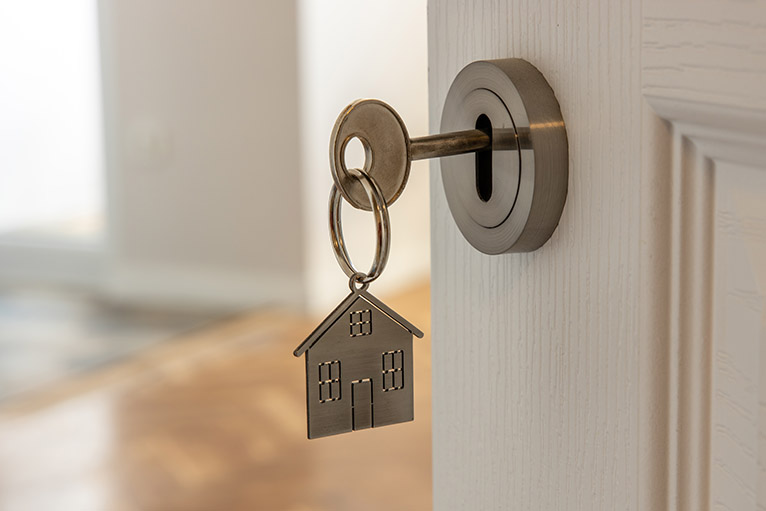Stamp duty and mortgage guarantees: How the government’s Budget affects homebuyers
On 3rd March 2021, Chancellor Rishi Sunak laid out the government’s spending plan for the year in the Budget. To boost the UK’s housing market during the coronavirus (COVID-19) pandemic, Sunak has extended the existing stamp duty holiday and announced a new mortgage guarantee scheme. Find out how these initiatives work and how they could affect you if you’re buying a home, below.
The stamp duty holiday has been extended
Save up to to £15,000 in tax when you’re buying a new home*

In July of last year, the governments of the UK put a temporary stamp duty holiday in place until the end of March 2021. For homebuyers in England and Northern Ireland, this meant that they didn’t have to pay stamp duty on the first £500,000 of their property’s value, up from the pre-COVID threshold of £125,000. However, Sunak has now extended the stamp duty holiday until 30th September 2021. So, people buying a residential property up until then can still save money on the cost of their new home.
How does the extended stamp duty holiday work?
From 8th July 2020 to 30th June 2021
No stamp duty will be paid on the first £500,000 of a residential property’s value. This applies to everyone – regardless of whether you’re a first-time buyer or you’ve owned property before.
From 1st July to 30th September 2021
No stamp duty will be paid on the first £250,000 of a residential property’s value. The existing special threshold of £300,000 for first time buyers applies from this date. This includes those buying through a shared ownership scheme.
From 1st October 2021 onwards
The standard, pre-coronavirus threshold of £125,000 comes back into place.
On 3rd March, the Welsh government also extended their stamp duty (known as Land Transaction Tax [LTT]) holiday, which was due to end on 31st March 2021. However, the new extension means that buyers in Wales won’t pay any LTT on the first £250,000 of a residential property, from now until 30th June 2021. From 1st July 2021, the LTT threshold will go back to the pre-coronavirus level of £180,000. Read more FAQs about the Welsh LTT holiday in our guide to moving house in lockdown.
How will the stamp duty holiday benefit potential homebuyers?
The stamp duty holiday extension is good news if you’re in the process of buying a new home but won’t complete your purchase by the end of March 2021, as it means you’ll still benefit from stamp duty savings.
The stamp duty holiday in Scotland wasn’t extended in the Spring Budget. Read more about paying stamp duty during the coronavirus pandemic in our guide to moving house in lockdown.
There’s a new mortgage guarantee scheme
Secure a mortgage without needing an unaffordable deposit

Since March last year, many mortgage lenders have stopped offering low-deposit mortgages (also known as high loan-to-value [LTV] mortgages), due to financial concerns around the coronavirus pandemic. As a result, the amount of low-deposit mortgages available to homebuyers has hit its lowest monthly level in years, according to government research.
So, to encourage lenders to start offering low-deposit mortgages and therefore help more homebuyers secure a mortgage, the government has created a new mortgage guarantee scheme.
How will the mortgage guarantee scheme work?
The mortgage guarantee scheme allows buyers to get a 95% mortgage with a deposit of 5%.
The government will give mortgage lenders on the scheme a guarantee that partially protects them from losing money due to non-payments. Under this guarantee, the government will compensate the mortgage lender on the amount of the mortgage that’s over 80%, if the homeowner fails to pay on their mortgage at some point.
So, anyone looking to buy a home of up to £600,000 will likely be able to find a mortgage of between 91 and 95%, with a deposit of 5%. This applies to mortgages on new build and existing homes. Plus, both first-time buyers and existing homeowners can take advantage of this scheme, as long as they meet the eligibility criteria.
Eligibility criteria for the government’s mortgage guarantee scheme

The mortgage must:
- Be a residential mortgage (not for a second home) and not buy-to-let.
- Have a loan-to-value of between 91% and 95%.
- Be taken out by an individual or individuals, not an incorporated company.
- Originate between the dates of the scheme (April 2021 to December 2022).
- Be a repayment mortgage, not interest-only.
The property must:
- Be in the UK.
- Be worth £600,000 or less.
The buyer must:
- Meet the usual requirements for getting a mortgage. This can be determined through a credit score test and loan-to-income ratio for example.
The scheme will be open for new mortgage applications from April 2021 to December 2022.
How will the mortgage guarantee scheme benefit potential homebuyers and current homeowners?
It seems that the scheme is off to a good start! The UK’s five largest banks (Santander, Barclays, Lloyds, HSBC and NatWest) have signed up to take part, according to the Financial Times.
For 75% of renters, the biggest barrier to buying their first home is not having enough savings for a deposit, rather than not being able to afford mortgage repayments, according to the Bank of England. So, if you’re a first-time buyer, the mortgage guarantee scheme means you won’t have to save as much money for your deposit as you would’ve earlier on in the pandemic.
For existing homeowners looking to sell their existing property and move up the property ladder, the mortgage guarantee scheme will give them the opportunity to get a better deal when it comes to remortgaging.
- Moving into a new home during the coronavirus pandemic? There’s tradespeople available on Rated People to help you at every step of the process – including removal companies, cleaners, decorators and more.
- Governments around the UK have confirmed that house moves can still go ahead during the coronavirus lockdown. Read the exact rules in our coronavirus FAQs for homeowners.




